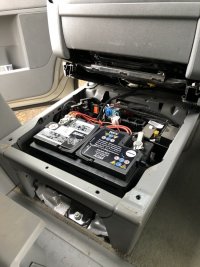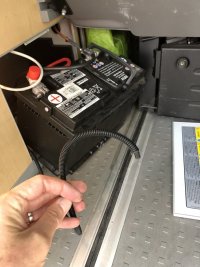ThomasHJ
Top Poster
Lifetime VIP Member
Thanks Thomas thats really handy to know - I will try to change my profile as hadnt thought to do that with my impending Coast
Thanks Thomas thats really handy to know - I will try to change my profile as hadnt thought to do that with my impending Coast
The Coast has 2 leisure Batteries mate, the same ones as the Ocean.We have also been on a site during the summer without EHU for 3 nights without any issues and some folk who attend festivals have gone 4 nights without issue.
I do make sure the batteries are fully charged before leaving home and the drive to the site keeps them fully charged.
As Thomas has said, just be aware of the battery drain by keeping an eye on the control panel and be economical with your use of anything electrical. Keep the fridge on a lower setting, avoid the parking heater (not an issue in the summer) and avoid plugging in your phones. The LED lighting doesn't consume very much but all the lights on will add up and increase the battery drain, so use these sparingly.
All common sense really.
One thought...does the Coast have two leisure batteries, the same as the Ocean/SE? If just one, the same applies but may only do 2 nights on one leisure battery.
Alan
Hi guys thanks for the replies we don't have solar panels and I'm not sure I would like the look of them on our fab vanI suppose using the diesel heater will use power as well, out of interest is it ok to say run the diesel heater all night in cold weather, is it safe and is it ok to do that?
Hi JenPrior to having solar panels fitted in 2017 I regularly went three or four days off-grid. I never really looked at battery percentages, as soon as voltage drops below a certain level so stuff like the fridge will no longer work and warm white wine is a big enough alarm bell to tell me my batteries are critically low.
My previous vehicle was a 2013 T5, it had an unrelated electrical fault, the batteries were tested when the fault was rectified and found to be in top condition so my less than diligent power management did not damage anything.
As for heating, remarkably effective, a lovely piece of kit, I did not buy a Cali to be cold so if justified it's on all night, all day and all the time until I don't need it. It uses power on start up, then settles down once operational to using not very much, so leaving it on all the time is probably more battery efficient than switching it on and off.
Hi Jen
Thanks for your reply I am relieved that it's safe to run it all night as I was worried about diesel fumes etcthe heater is utterly amazing isn't it and I am so glad our van has this as i don't know whether this is standard equipment or an option! The only concern Linda had that is at night when you first turn on the heater it sounds a bit loud and she was a bit concerned it might bother people on nearby pitches or isn't it too loud outside?
Andy
Hi guys I am a new owner and have just done our first trip for 3 nights, in the Lakes we are total noobs but we loved it even though we didn't practice getting the awning out before we got there so we did struggle with it but we managed it
I really want to visit a site in August but it has no EHU my van is a 2019 T6 California so my question is what percentage level is it ok to take the battery down to as I have no idea, I don't want to damage the battery!
I would get a £10 carbon monoxide alarm, if you want to be sure.Hi guys thanks for the replies we don't have solar panels and I'm not sure I would like the look of them on our fab vanI suppose using the diesel heater will use power as well, out of interest is it ok to say run the diesel heater all night in cold weather, is it safe and is it ok to do that?
Why would you need to drill holes to fit Solar?I’ve owned our 2008 T5 since 2009 and it is used for camping and a few day trips only. It’s sat for months at a time and only gets plugged in at alternate campsites on our 2 week summer France trips. If we camp a weekend or 5 days in New Forest, it’s on grass with no plugging in. The 13 years old leisure batteries still work perfectly and charge to 13v. We regularly camp for 7 nights without plugging in. We use the fridge and light etc. Don’t plug much else in. Our batteries drop 10% a day. Am sure we’ve dropped down to 30% many many times. Batteries still going strong. It has batteries for a reason. Using them won’t break them. There’s 2 on mine and they’re very big and powerful!
You don’t need solar unless you’re planning a 6 month trip IMO. I’ve never liked the idea of someone drilling holes in our van.
Waste of time for the Parking Heater. Not so for the Gas Hob.I would get a £10 carbon monoxide alarm, if you want to be sure.
Running any lead acid battery below 50% is a sure fire way to destroy it. Leisure batteries need charging by an intelligent charger to last their longest, rather than the huge currents from an alternator by short bursts!Thanks guys I have got a carbon monoxide alarm and as for the batteries I do find it a bit strange that some people say you shouldn't drop the leisure batteries below 60%! they do charge to 100% so what's wrong with going down lower than that
Use pre charged power banks for charging your devices. It’ll save some van battery and you can charge whilst out and about. You can also get portable solar panels that you can hook on to a back pack. Ravpower are a good make.Hello, new Cali owner with zero experience here
We're heading to a site in August where I understand there are no electric hook-ups, so my question is how long do you folks think I could use the Van's internal electrics (fridge, lights, probably USB chargers for phones) without needing to go for a drive (or recharge the batteries)?
JT
It's not the volts that the batteries charge to, it's the capacity that they attain that signifies their condition.This summer when my roof sensors thought the roof was open the control panel wouldn’t turn off so after a couple of months, flat leisure battery. Error code comes up with no power. Plugged the van in overnight on the drive. Next day, all fine. 13 year old batteries that came with the van in 2008. We’ve been away 3 times since. Not plugged in. No problems at all. Charge to 13v.
Maybe our sub optimal use of them has conditioned them to survive!? There is no apparent difference now to when I got them in 2009.
Just to add a little detail: whilst discharged lead sulphate builds up on the plates inside the battery. The thickness of the lead sulphate buildup is determined by both the depth of discharge and the time in the discharged state. Mathematically: sigma (dod x t).I do find it a bit strange that some people say you shouldn't drop the leisure batteries below 60%! they do charge to 100% so what's wrong with going down lower than that



The VW California Club is the worlds largest resource for all owners and enthusiasts of VW California campervans.

